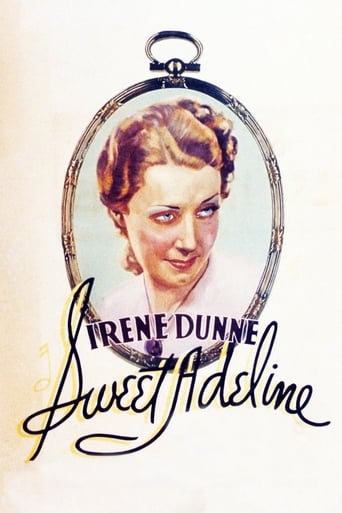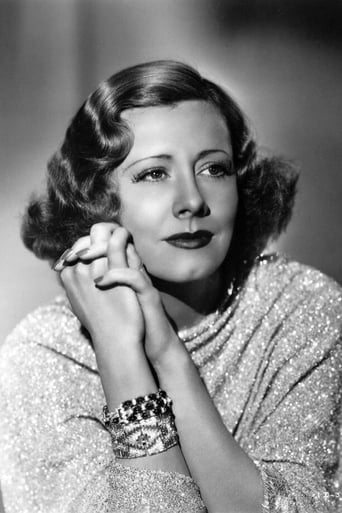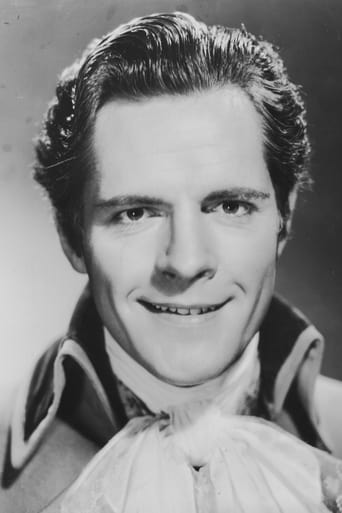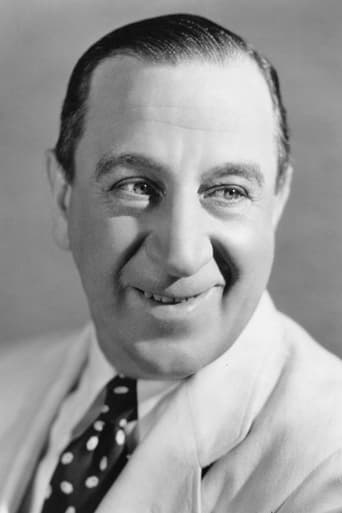

Sweet Adeline (1934)
In 1898, composer Sid Barnett manages to get his sweetheart, Adeline the beer-garden singer, to sing the lead in his new Broadway operetta; this infuriates Elysia, the erstwhile star. But Sid frets as Adeline spends increasing amounts of time with the dashing Major Day.
Watch Trailer
Cast


Reviews
Irene Dunne is "Sweet Adeline," who sings in a beer garden and has aspirations as a professional singer. Her father is opposed to Donald Woods, who write songs, as a suitor. Hugh Herbert plays an eccentric yet likable character (when did he not), who is trying to catch a spy, who is a famous singer. All this sounds admittedly simple-minded, undemanding and corny, but that's why I found it to be refreshing. Hugh Herbert's scenes with Nydia Westman, as Irene's sister, were very natural and were genuinely amusing/funny. Perhaps the highlights of the film are the outstanding songs written by Kern/Hammerstein, sung to perfection by Ms. Dunne. Despite the old feel of this film, I would watch this again, not expecting much except a good, easy-going time with Irene Dunne and company.
If not for her great voice and her usual charming performance, and of course Kern and Hammerstein's great music, this movie is total drivel. It's like Warner Bros. was trying to do 42nd Street or one of the Gold Diggers movies in an 1890's setting. And then they add stock players like Ned Sparks and Hugh Hubert who are both annoying as anything, playing the same dumb characters they do in every movie. Wini Shaw was good as usual, but it's annoying to see her singing and talking with a phony French accent. And Donald Woods was no great actor, he really couldn't hold his own next to Dunne. No wonder why he never made it big. The studio went all out on the sets and costumes though, which make the movie a little more enjoyable... It's just a shame that with such great music and production values and Irene Dunne as the star, that this movie didn't turn out better...
Sweet Adeline was presented on the Broadway stage back in 1929 and was primarily a vehicle for Helen Morgan. Morgan had just made a big hit in Kern's greatest musical, Showboat, in the supporting part of Julie LaVerne. She got such raves for that part that a whole show was built around her. I tend to think that she was deep into alcoholism at the time this was done and was not asked to do the film version. Sweet Adeline unfortunately during its run, ran headlong into the Great Depression and had to close.Irene Dunne carries the film version here and does a remarkable job. She was one of the great Hollywood talents of her time with an exquisite soprano voice for films like these and a good sense of comedy for some of the non-musical parts she did. She performs the standards that Morgan introduced on Broadway as good as Morgan did. Sweet Adeline had two big hit numbers Why Was I Born and Don't Ever Leave Me which are two of the best Jerome Kern ever wrote. Otto Harbach wrote the lyrics.Unfortunately and I think that this was because Sweet Adeline was a star vehicle for Helen Morgan when originally done, Ms. Dunne was not given a strong leading man. Donald Woods was a competent actor, with all the charisma of dishwater. His best known part in films was in A Tale of Two Cities where he played Charles Darnay where essentially all he had to do was look handsome and earnest. More was required here and Irene could have used Allan Jones who she did Showboat with or if you wanted a non-singer, Cary Grant, Melvyn Douglas, or Spencer Tracy all of whom she did some classic films with. The rest of the cast was good. Louis Calhern played the villain in the best Snidely Whiplash tradition. His proposition to Irene that he was not interested in marriage to her, just in living together was generations ahead of its time. Ned Sparks and Hugh Herbert perform their usual parts in Warner Brothers musicals and there were some nice turns by Nydia Westman and Joseph Cawthorn as Dunne's sister and father respectively. Mervyn LeRoy did succeed nicely in capturing the old fashioned flavor of life at the turn of the last century. If you're an Irene Dunne fan this is a must.
Chock full of sweet melodies by Jerome Kern, this lavish period musical takes Irene Dunne from Hoboken to Broadway, but in a tin-lizzie of a plot. Set in 1898, in a world of beer gardens and theatres, the film works up plenty of nostalgia -- with horseless carriages, Edison's new "pho-no-graph", and even an audition by "that Jolson kid" ["He'll never get anywhere"]--but self-consciously drops these references in like lead weights. Meanwhile, the screenwriter tries out a tiresome conflict of stage career vs. disapproving papa, then a wholly disposable spy subplot, and finally settles on a dull love triangle.Irene Dunne supplies much-needed star authority to hold it together, but seems baffled that she has no plausible leading man - where is Cary Grant? -- and no plausible scenes to play. Still, she is a professional, and delivers a surprisingly affecting "Why Was I Born?" In return, she enjoys a knockout wardrobe in white organza and feathers from Orry-KellyBut what pallid consorts she gets! The erstwhile leading man is Donald Woods, an estimable actor [memorable as Bette Davis' brother in WATCH ON THE RHINE], but here positively evaporating off the screen whenever a stronger personality shares the scene. His songwriter character, when allowed a frame to himself, comes off as callow and egotistical. In the third corner of this love triangle, Louis Calhern-moustachios a-twirl-- plays a military recruiter for Teddy Roosevelt's Rough Riders, but also fades into the scenery.Luckily, the music keeps coming, one verging-on-operetta tune after another, staged with a clear Busby Berkeley influence. An amusing Sultan's palace number has a basso trying to sing through the chaos of rehearsal. There's a beer garden singalong of "Polka Dots"; a parade of hansom cabs for "Twas Not So Long Ago"; and hordes of dancers in chiffon enact "Lonely Feet". Appealing Irish tenor Phil Regan [why didn't HE play the lead?] joins Irene Dunne in a country bower filled with flowers, swans, twinkling stars and girls on daisy-swings in "We Were So Young". Finally, and imaginatively, a torn-up score is used for a charming ending with "Don't Ever Leave Me". [Yes, the title tune --not by Kern---is briefly sung.] Throughout, Sol Polito's camera tracks from pretty pastorals to hard-edged dance numbers, but always bathes Irene Dunne in flatteringly soft light for big juicy movie-star closeups.The heroes behind the scene are the editors at Warners, chopaholics in the 1930's, who made every frame of film fight to stay in the picture. This produced razor-fast comedies [like FIVE STAR FINAL] and gangster operas [like BULLETS OR BALLOTS], while protecting the product from harried and unimaginative directors. [Indeed, when director Mervyn LeRoy moved to MGM, his films slowed to a lumbering pace]. Here, the editors relax for the leisurely musical numbers, but seize their scissors again every time the plot surfaces, winning our applause for speeding us through the creaky parts.




